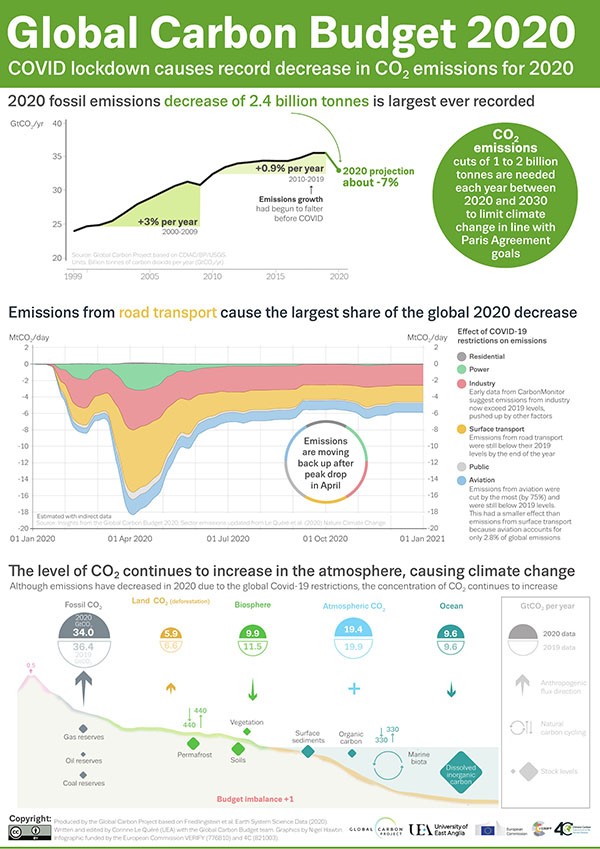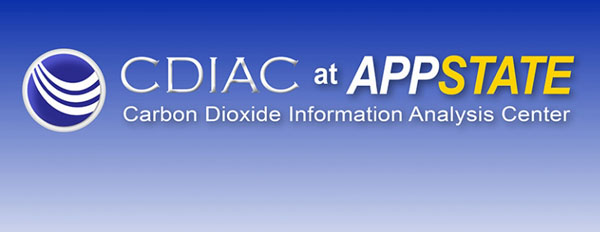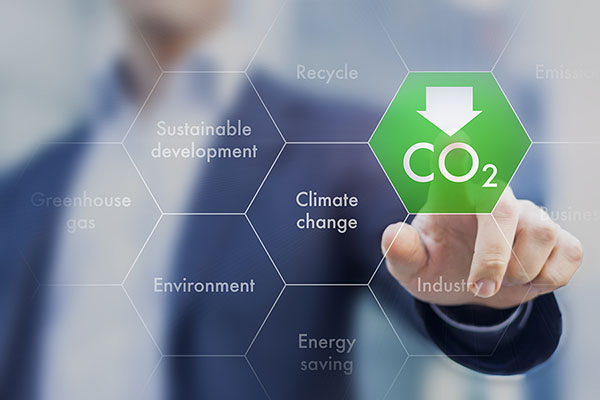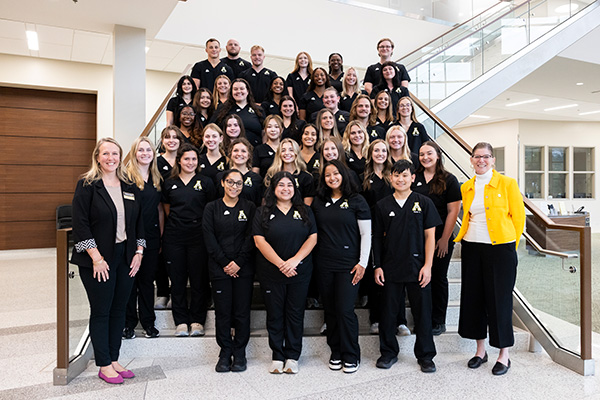Appalachian State University scientists Dr. Gregg Marland, left and Dr. Dennis Gilfillan ’08 are among 86 scientists worldwide who contributed their expertise to the Global Carbon Project’s 2020 Global Carbon Budget — an annual, in-depth report on the amount of CO2 produced by the world’s nations and how much enters the ocean, is taken up by growing plants or accumulates in the atmosphere. Marland holds a dual appointment as an adjunct research professor in App State’s Department of Geological and Environmental Sciences and Research Institute for Environment, Energy, and Economics (RIEEE). Gilfillan is a postdoctoral research scholar in RIEEE and a staff member in the university’s Appalachian Energy Center. Photos by Chase Reynolds

This infographic shows highlights from the Global Carbon Project’s 2020 Global Carbon Budget, including a decrease of 2.4 billion tons of carbon dioxide (CO2) emissions from fossil fuels — such as coal, oil and natural gas — from 2019 to 2020. This is the largest decrease ever recorded, according to GCP, with the drop in CO2 attributed to quarantines and travel restrictions due to the global coronavirus pandemic. Global Carbon Project image
BOONE, N.C. — The Global Carbon Project (GCP) has released its annual 2020 Global Carbon Budget, which estimates CO2 emissions for the year have decreased by 2.4 billion tons — the largest drop ever recorded, according to GCP. More than 80 scientists from 68 institutions in 16 countries worldwide co-authored this year’s report, including Appalachian State University scientists Dr. Dennis Gilfillan ’08 and Dr. Gregg Marland.
The 2020 budget, released Dec. 11, estimates total emissions for the year — about 34 billion metric tons of CO2 — will be 7% lower than in 2019 because of the impact of the COVID-19 pandemic and the resultant quarantines and travel restrictions. Further, the report shows an estimated 24 countries with growing economies, including the U.S., had declining fossil fuel CO2 emissions from 2010–19.
“The widely perceived challenge is to build back from the pandemic in a way that does not lead to continuing growth in CO2 emissions,” said Gilfillan, who is a postdoctoral research scholar in App State’s Research Institute for Environment, Energy, and Economics (RIEEE) and a staff member in the university’s Appalachian Energy Center.

This infographic shows highlights from the Global Carbon Project’s 2020 Global Carbon Budget, including a decrease of 2.4 billion tons of carbon dioxide (CO2) emissions from fossil fuels — such as coal, oil and natural gas — from 2019 to 2020. This is the largest decrease ever recorded, according to GCP, with the drop in CO2 attributed to quarantines and travel restrictions due to the global coronavirus pandemic. Global Carbon Project image
For the annual budget, Gilfillan and Marland, who holds a dual appointment as an adjunct research professor in RIEEE and the Department of Geological and Environmental Sciences, contributed to the analysis of CO2 emissions from energy use and industrial processes.
An international organization, GCP brings together scientists from around the world to produce annual updates on its Global Carbon Budget, which analyzes how much CO2 is released to the atmosphere each year and how much of this carbon enters the ocean, is taken up by growing plants or accumulates in the atmosphere with effects on the climate system. CO2 entering the ocean changes the acidity of the ocean and creates problems for the environment, according to Gilfillan and Marland.
The 2020 Global Carbon Budget notes atmospheric CO2 has increased an estimated 48% since 1750 — and is continuing to rise. In 2019, human-caused CO2 emissions reached 42.2 billion metric tons in 2019 (a metric ton is about 1.1 U.S. tons) and the atmospheric concentration of CO2 rose to 409.85 parts per million (parts of carbon dioxide that exist in one million parts of air), according to the report’s estimates.
Human-caused emissions come from burning coal, oil and natural gas and some industrial processes such as manufacturing cement (collectively 36.3 billion metric tons) and the destruction of forests. According to Gilfillan and Marland, recent reports from other international research efforts have emphasized prompt and major reductions in CO2 emissions are needed to minimize the environmental and economic damages of severe changes in climate.
Marland said, “The first step toward a solution for climate change is to acknowledge and understand what is happening now.”
What do you think?
Share your feedback on this story.
About the Research Institute for Environment, Energy and Economics
Since 2008, Appalachian State University’s Research Institute for Environment, Energy and Economics (RIEEE) has fostered interdisciplinary research on the environment, energy and economics, especially the areas in which these subjects intersect. The institute serves as an umbrella organization for three research centers: the Appalachian Energy Center, Center for Economic Research and Policy Analysis, and Southern Appalachian Environmental Research and Education Center. Additionally, the institute manages and supports App State’s student-led solar vehicle team, Team Sunergy — an exemplary model of the integrative and experiential student learning, leadership and innovation opportunities the institute seeks to foster at App State. Learn more at https://rieee.appstate.edu.
About the Department of Geological and Environmental Sciences
Located in Western North Carolina, Appalachian State University provides the perfect setting to study geological and environmental sciences. The Department of Geological and Environmental Sciences provides students with a solid foundation on which to prepare for graduate school or build successful careers as scientists, consultants and secondary education teachers. The department offers six degree options in geology and two degree options in environmental science. Learn more at https://earth.appstate.edu.
About the College of Arts and Sciences
The College of Arts and Sciences (CAS) at Appalachian State University is home to 17 academic departments, two centers and one residential college. These units span the humanities and the social, mathematical and natural sciences. CAS aims to develop a distinctive identity built upon our university's strengths, traditions and locations. The college’s values lie not only in service to the university and local community, but through inspiring, training, educating and sustaining the development of its students as global citizens. More than 6,800 student majors are enrolled in the college. As the college is also largely responsible for implementing App State’s general education curriculum, it is heavily involved in the education of all students at the university, including those pursuing majors in other colleges. Learn more at https://cas.appstate.edu.
About Appalachian State University
As a premier public institution, Appalachian State University prepares students to lead purposeful lives. App State is one of 17 campuses in the University of North Carolina System, with a national reputation for innovative teaching and opening access to a high-quality, cost-effective education. The university enrolls more than 21,000 students, has a low student-to-faculty ratio and offers more than 150 undergraduate and 80 graduate majors at its Boone and Hickory campuses and through App State Online. Learn more at https://www.appstate.edu.

















